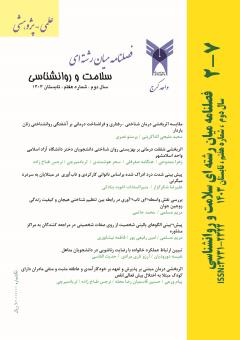مقايسه اثربخشي درمان شناختي -رفتاري و فراشناخت درماني بر آشفتگی روانشناختی زنان باردار ؛ سعید ملیحی الذاکرینی / پرستو نصری
محورهای موضوعی : رواندرمانی فراشناختی
1 - عضو تمام وقت هیئت علمی و مدیر داخلی نشریه
کلید واژه: واژههای کلیدی: درمان شناختي -رفتاري, فراشناخت درماني, آشفتگی روانشناختی , زنان باردار. ,
چکیده مقاله :
چکیده هدف پژوهش حاضرمقایسه اثربخشي درمان شناختي -رفتاري و فراشناخت درماني بر آشفتگی روانشناختی در زنان باردار بود. روش پژوهش حاضر، کمی از نوع طرح های نیمه آزمایشی با پیش آزمون ، پس آزمون و پیگری و گروه گواه بود. جامعه آماری پژوهش حاضر متشکل از زنان باردار در 3 ماهه دوم بارداری مراجعهکننده به بیمارستانها و کلینیکهای بارداری برای چکاپ ماهانه ی بیمارستان آراد در شهر تهران در سال 1400-1399 بود. پس از بررسی ملاکهای ورود و خروج،45 نفر از زنانی که ملاکهای ورود به پژوهش را داشتند، مورد شناسایی قرار گرفتند و در سه گروه 15 نفره، یعنی دو گروه آزمایش و یک گروه گواه بهصورت گمارش تصادفی، قرار گرفتند. روش نمونه گیری غیرتصادفی و در دسترس بود. پس از دستیابی به گروه نمونه ابتدا تمامی شاخصها یعنی پرسشنامه آشفتگی روانشناختی لابیوند و لابیوند(1995) بهعنوان پیشآزمون بر روی آزمودنی اجرا شد. سپس دوره های درمان شناختی رفتاری که به مدت 10 جلسه یک ساعت و نیم بود و همچنین دوره درمان فراشناخت که به مدت 8 جلسهی یک ساعت و نیم بود، بر روی گروه آزمایش اجرا شد. پس از پایان دوره از هر دو گروه آزمایشی و گروه گواه، پسآزمون و 2 بعد آزمون پیگیری گرفته شد. یافته ها حاکی از آن بود که درمان فراشناختی و درمان شناختی رفتاری باعث کاهش شاخص های اساسی آشفتگی روانشناختی شامل اضطراب، استرس و افسردگی در پایان مداخلات و دوره پیگیری شده بودند (05/0>p). روش فراشناخت درمانی باعث کاهش بیشتر مؤلفههای اضطراب، استرس و افسردگی شده است (05/0>p). می توان اینگونه نتیجه گرفت که در درمان فراشناختی فرض می شود فراشناخت ها عواملی هستند که فرایند آگاهی شخص را ارزیابی، نظارت و کنترل می کنند و به دلیل تأثیری که درمان فراشناخت بر اصلاح باورهای فراشناختی دارد میتواند به تنهایی و یا با درمان مکمل در کاهش اضطراب، استرس و افسردگی در زنان باردار مؤثر باشد.
Abstract The aim of the present study was to compare the effectiveness of cognitive-behavioral therapy and metacognitive therapy on psychological disturbance in pregnant women. The method of the present research was quantitative of the type of semi-experimental design with pre-test, post-test and follow-up and control group. The statistical population of the present study consisted of pregnant women in the second 3 months of pregnancy who referred to hospitals and pregnancy clinics for monthly checkups at Arad Hospital in Tehran in 2019-1400.After checking the entry and exit criteria, 45 women who met the criteria for entering the research were identified and were randomly assigned into three groups of 15 people, that is, two experimental groups and one control group. The sampling method was non-random and available. After obtaining the sample group, first all the indicators, namely the psychological disturbance questionnaire of Labivand and Labivand (1995) were performed on the subjects as a pre-test. Then, cognitive behavioral therapy courses, which lasted for 10 sessions of one and a half hours, as well as metacognitive therapy sessions, which lasted for 8 sessions of one and a half hours, were performed on the experimental group. After the end of the course, a post-test and two follow-up tests were taken from both experimental and control groups. The findings indicated that metacognitive therapy and cognitive behavioral therapy reduced the basic indicators of psychological disturbance including anxiety, stress and depression at the end of the interventions and the follow-up period (p<0.05). The method of metacognitive therapy has caused a greater reduction in the components of anxiety, stress and depression (p<0.05). It can be concluded that in metacognitive therapy, it is assumed that metacognitions are factors that evaluate, monitor and control the process of a person's consciousness, and due to the effect that metacognitive therapy has on correcting metacognitive beliefs, it can be used alone or with complementary therapy to reduce Anxiety, stress and depression in pregnant women are effective.
منابع
انوری، حسن. (1399). ¬رابطه معنای زندگی با بهزیستی روانشناختی در رضایت از زندگی دانشجویان شهر
اصفهان، پایان نامه کارشناسی ارشد دانشگاه اصفهان.
دانش، عصمت؛ امین الرعایایی، پریسا و نوری پورلیاولی، رقیه. (۱۳۹۶). رابطه سطوح تاب آوری، بهزیستی روانشناختی و
رضایت زناشویی در زوجین نابارور تحت درمان لقاح خارج رحمی . مجله سلامت اجتماعی، دوره ۴، شماره۳، صص
۱۷۰-۱۷۸.
قائدی، غلامحسین؛ یعقوبی، حمید .(1396). بررسی رابطه بین ابعاد حمایت اجتماعی ادراک شده و ابعاد بهزیستی در
دانشجویان دختر و پسر. مجله ارمغان دانش، دوره 13، شماره 2 (پیاپی 5). 81-69.
کاپلان ـ سادوك سادوك، ب.؛ سادوك، و. (2007). خلاصه روانپزشکی. ترجمه فرزین رضاعی (1402). تهران:
انتشارات ارجمند.
نوروزی، حمید؛ عطادخت، اکبر؛ غفاری، عذرا .(1397). تأثیر آموزش حل مسئله اجتماعی در ارتقای بهزیستی روان
شناختی و تاب¬آوری کودکان دارای اختلال یادگیری. دوره سوم. مجله علمی – پژوهشی. شماره 2. 108-92.
Ahmadi, S., Tabibi, Z., Mashhadi, A., Eshraghi, P., Faroughi, F., Ahmadi, P. (2017).
Effectiveness of group cognitive-behavioral therapy on anxiety, depression and
glycemic control in children with type 1 diabetes. Int J Pediatr. 2(3.1):165-71.
Akiki S, Avison WR, Speechley KN, Campbell MK. Determinants of maternal antenatal
state-anxiety in mid-pregnancy: Role of maternal feelings about the pregnancy. J Affect
Dis. 2016;196:260-7.
Arch, J. J. (2013). Pregnancy-specific anxiety: which women are highest and what are the
alcohol-related risks? Compr Psychiatry, 543) 21728.
Banerjee,S. (2012). Causes and management of stress at work. Occupational and
Environmental Medicine, 59: 67–72
Beattie J, Hall H, Biro MA,East C, Lau R. Effects of mindfulness on maternal stress,
depressive symptoms and awareness of present moment experience: A pilot randomised
trial. Midwifery 2017;50:174-83.
Ben-Zur H. (2013). Happy adolescents: the link between subjective well-being, internal
resources, and parental factors. Journal of Youth and Adolescence; 32(2): 67–79.
Blackburn, D.F., Swidrovich, J., Lemstra, M. (2018). Nonadherence in type 2 diabetes:
practical considerations for interpreting the literature. Patient Prefer Adherence.
7:183-9. DOI: 10.2147/PPA.S30613 PMID: 23487395
Campbell, R.L, & Svenson, L.W. (2012). Perceived level of stress among University
undergraduate students in Edmonston, Canada. Perceptual and Motor Skills, 75: 552-
554.
Cartwright - Hatton. S and Wells. A, (2017), Beliefs about worry and intrusions: the meta-
cognitions questionnaire and its correlates, Journal of Anxiety Disorders 11, pp. 279–
296.
Colbear, J., & Wells, A. (2008). Randomized controlled trial of metacognitive therapy for
posttraumatic stress disorder. Manuscript in preparation.
Diener,E.,Oishi,S.,&Lucas,R.E.(2010).S ubjective well-being:The science of happiness
and life satisfaction.In C.R. Snyder & S.J. Lopez (Ed.), Handbook of Positive
Psychology. Oxford and New York :Oxford University Press.
Duncan, L. G., & Baradacke, N. (2010). Mindfulness-Based Childbirth and Parenting
Education: Promoting Family Mindfulness during the Perinatal Period. Child FAM
Stud, 19.190-202.
Gourounti, K., Anagnostopoulos, F., Sandall, J. (2014). Poor marital support associate
with anxiety and worries during pregnancy in Greek pregnant women. Midwifery;
30(6): 628-35.
Hall HG, Beattie J, Lau R, East C, Biro MA. Mindfulness and perinatal mental health: A
systematic review. Women and Birth. 2016; 29(1):62-71.

